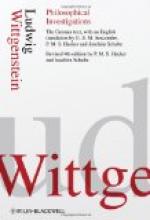|
This section contains 11,537 words (approx. 39 pages at 300 words per page) |

|
SOURCE: "Wittgenstein's Philosophizing and Literary Theorizing," in New Literary History, Vol. 19, No. 2, Winter 1988, pp. 209-37.
Quigley is an English-born writer and educator. In the following essay, he questions whether, given Wittgenstein's personal aversion to systems of philosophical analysis, it is possible for literary theorists to employ a truly "Wittgensteinian" method of analysis.
Among the well-known thinkers whose ideas have achieved prominence in modern literary theory, Wittgenstein strikes many as the most problematic. It is often difficult to get any precise sense of what the fuss is about. Literary theorists with a Wittgensteinian turn of mind seem firmly convinced about their position but betray little of the inclination, so common in literary theory today, to advertise noisily or display graphically the origins of their intellectual labors. Direct recourse to Wittgenstein's writings often seems no more satisfying. His major work, Philosophical Investigations, is a peculiar aggregate of loosely related paragraphs...
|
This section contains 11,537 words (approx. 39 pages at 300 words per page) |

|


